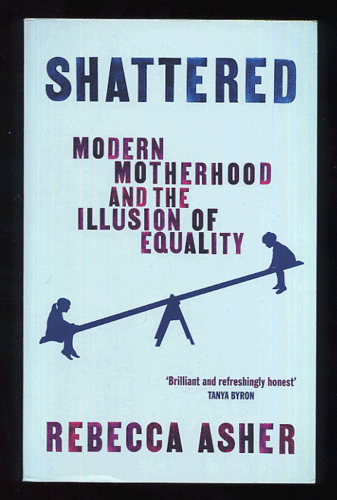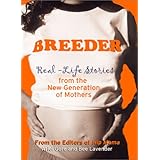
 This was going to be an exploration of the term “motherhood” in contrast to “parenthood”, using two books (Breeder: Real-Life Stories From the New Generation of Mothers edited by Ariel Gore and Bee Lavender and Shattered: Modern Motherhood and the Illusion of Equality by Rebecca Asher) to help bounce ideas around. I ended up with basically the longest post I’d ever written while feeling like I hadn’t even really started yet. So I’m splitting this up into several posts, each inspired by themes encountered in the books. I’ll tag them all “mvp” for Motherhood v.s Parenthood and breeder or shattered or both, in case you’re interested. I suspect this project will last a long time, don’t expect the parts to be posted very frequently. I’ll probably have at least 5 drafts going at any one time! This particular post is now merely introduction, and, with that in mind, based solely on the books’ introductions/forewords. While I fully intended to limit discussion to these two books, forming a sort of review alongside my personal anecdotes, I suspect I’ll be bringing in quotes or further elaboration from other sources where relevant.
This was going to be an exploration of the term “motherhood” in contrast to “parenthood”, using two books (Breeder: Real-Life Stories From the New Generation of Mothers edited by Ariel Gore and Bee Lavender and Shattered: Modern Motherhood and the Illusion of Equality by Rebecca Asher) to help bounce ideas around. I ended up with basically the longest post I’d ever written while feeling like I hadn’t even really started yet. So I’m splitting this up into several posts, each inspired by themes encountered in the books. I’ll tag them all “mvp” for Motherhood v.s Parenthood and breeder or shattered or both, in case you’re interested. I suspect this project will last a long time, don’t expect the parts to be posted very frequently. I’ll probably have at least 5 drafts going at any one time! This particular post is now merely introduction, and, with that in mind, based solely on the books’ introductions/forewords. While I fully intended to limit discussion to these two books, forming a sort of review alongside my personal anecdotes, I suspect I’ll be bringing in quotes or further elaboration from other sources where relevant.
I would like to start by stating my discomfort about talking about “mothers” instead of “parents”. I never imagined myself as a mother, only a parent, and could insist that male and female parents should be viewed in the same light – that any division is counter productive. I’ve pondered this on here before, three months before Polly was born.
There is a difference though. A male parent doesn’t have to take on many childcare tasks to be considered an excellent father. In contrast a female parent only has to abdicate a small amount of responsibility to be considered a “bad mother”. I know this is simplistic, but a father can be 80% absent, 15% ok and 5% good to be considered a virtuous paragon of fatherhood, a model to emulate. A mother on the other hand may be 90% brilliant, but will still be criticised (or at least pitied) for a mediocre 10%.
Consider the differing meanings of “mothering” a child (cuddle it, care for it, clean it and feed it) and “fathering” a child (getting a positive result in a paternity test).
This disparity doesn’t help any gender. It leaves no model for non-heteronormative families, heaps unnecessary and harmful pressure onto mothers, and paints a wholly unfair picture of fathers as absent and useless, who should be applauded for changing one nappy a month, and whose only contribution to their offspring’s upbringing is the occasional rough play on a weekend or unnecessarily expensive gift.
It grates every time “mother” is used where “parent” would be more appropriate. So I do apologise if, by talking about these books on “motherhood” I rub you up the wrong way. It’s not intentional.
Dan Savage seems to savagely miss the point (his rose tinted glasses put him off perhaps) in his foreword to Breeder, saying optimistically of his mother and her peers:
“They were the last generation to blindly take on the role of mother, allowing other people’s opinions about what a mother is or does or thinks or wears to limit them.”
As if since the 1970s parental guilt ceased to exist, the state stopped intruding into children’s lives, official and professional advice suddenly became consistent and clear, and the media ceased to demonise both stay at home mums (feminist failures, no contribution to society, lazy, dependent) and working mums (selfish, absent, cold) with equal zeal.
If only.
Gore’s introduction says “We aren’t the […] corporate beauties you see in the mainstream parenting magazines, and we aren’t the purer-than-thou organic earth mamas you see in the alternative glossies. We are imperfect, and we are impure.”
The roster of mamas telling their stories in this tome, though, is very diverse. Just like all other people are. It’s as if in seeking to create an alternative definition of what it means to be a modern parent, so much diversity has foiled all attempts. In escaping any attempt to pin down a definition, the message to me is that parents, specifically mothers, are people too. This should not be news!
In the introduction to Shattered, Asher says:
“[…] I was entirely unprepared for the fundamental undoing of the life and identity I’d carefully constructed for myself over the previous fifteen years and, in particular, the demolition of the equality that I’d thought to be at the heart of my relationship with my husband. This illusion of equality was completely shattered.”
It’s this “Who the hell am I now?” she alludes to that underpins many stories in Breeder too. Does your identity as a person end when your identity as a mother begins? What do you have to do to retain it? I do feel terribly lucky that I haven’t felt that “independence, sense of recognition and daily purpose […] gave way to gruelling, unacknowledged servitude.”
The only thing that frustrates me is a failure of people to understand that just being with a small child all day is hard enough work, that managing to get half a load of washing out in the space of a day is an achievement. The thing that separates me from Asher here is that I don’t feel deprived of any “earlier life” so certainly don’t miss it. I don’t resent motherhood, even if I might resent some (I feel) unrealistic expectations on me. She talks of feeling “filled with envy” when seeing “young women determinedly heading off to work dressed immaculately and with the luxury of a solitary bus ride ahead of them.” The same sight would fill me with relief – thank goodness I too don’t have to rush to some soul destroying office for pointless work with uninspired people.
I know I am lucky in this respect. I see it as a blessing that my previous job (while I enjoyed it at the time and found lots of it very fulfilling) retains zero emotional or aspirational hold over me. I’m glad I don’t have to go back.
Right now I have the best of both worlds – I have no pressing financial need to return to that kind of work, yet can dip into our own business as and when I like. In fact I would argue that I contribute more to the profitability of our business without the responsibilities another job would entail, even if I only put in an hour or two a week. I know, I’m talking from a position of privilege here that I wouldn’t change for the world.
Even though I like to think that Asher’s introduction isn’t talking about me, of course, it is talking about me: me, people like and unlike me, the full diverse roster of mothers depicted in Breeder and our place in society.
I do feel a disparity in the sacrifices I make as a parent in comparison to those Polly’s dad does as a father. I don’t begrudge the sacrifices (or to be honest even usually see them as such) but the difference intrigues me. It’s not just about employment or earning potential. There’s more than that and I’m sure he would agree. Right now he’s in his office, not working, indulging some whim or other. I’m lying in bed next to my sleeping daughter. In the morning when she wakes up, I’ll take her downstairs, change her, clean her, feed her. He’ll stay in bed. None of these differences have anything to do with our differing involvements in paid work.
Asher finds this disparity troubling, this “unfair burden of domesticity.” I contend that it is our choice – I could have taken the minimum 6 weeks maternity leave and deposited Polly into childcare. I could give them his number instead of mine for emergencies. I could leave her crying at night until either he wakes up and deals with it or she learns not to bother. I could decide to stay in bed in the morning until he gets up too, no matter what Polly has to say about it. But I don’t want to.
This IS my choice and I own it.
Meanwhile, I acknowledge that society says that me taking this on (so he doesn’t have to) doesn’t make him a bad father, whilst me refusing that responsibility, even for a fraction of the time, would make me a “bad mother.” That IS inequality, and I want to explore it.
My choice (not that I’d necessarily make a different one) shouldn’t be about being a “bad mother” or not, it should be about what I feel comfortable with. It should be about both of our lives as parents.

Pingback: Lent 2: It Wasn’t the Father’s Fault | impeus.com